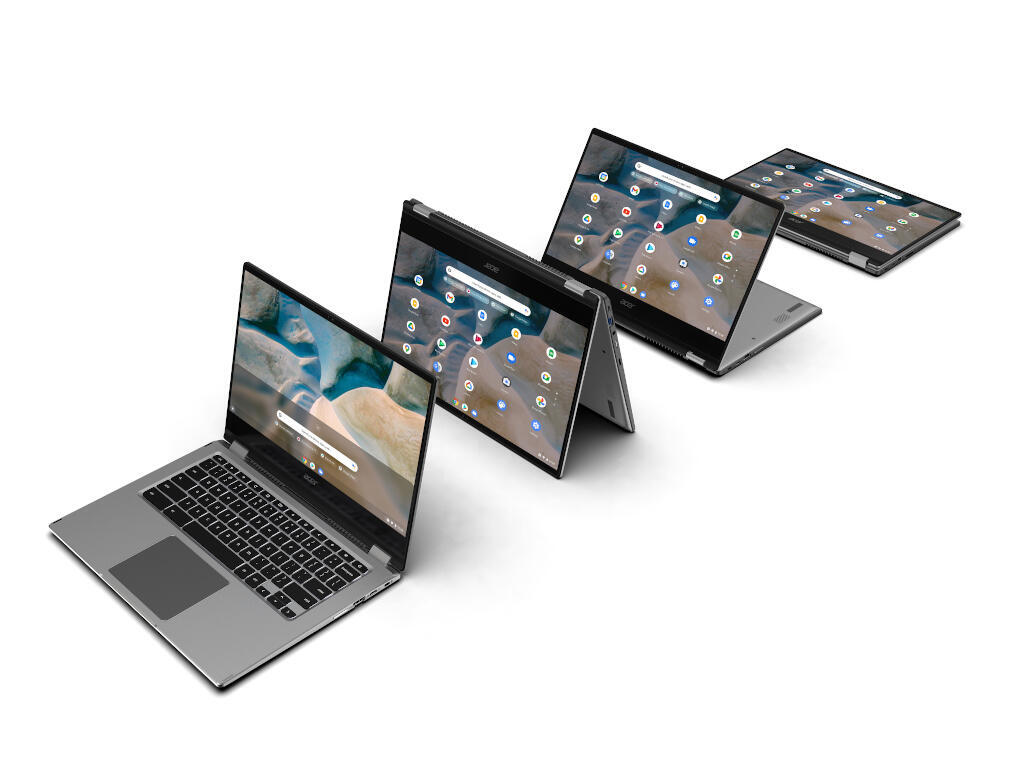Shipments of Chromebooks jumped by 75% in the second quarter, boosting overall results for the worldwide PC market, says Canalys.

Image: Acer
PC shipments around the world hit 121.7 million units last quarter, a gain of 10% from the same quarter in 2020, research firm Canalys said on Thursday. The second-quarter results from Canalys include laptops, desktops, Chromebooks and tablets, but it was the red-hot demand for Chromebooks that provided the biggest spark.
SEE: How to run Windows or Mac apps from your Chromebook (TechRepublic)
Outshining other types of devices, Chromebook shipments vaulted to 11.9 million units last quarter, a hike of 75% from the year-ago quarter. HP retained the top spot with shipments of 4.3 million, a gain of 116% from 2020's second quarter. In second place, Lenovo accounted for 2.6 million in shipments, generating growth of 82% from a year ago.
Third place Acer shipped 1.8 million units for a gain of 83%. Dell was the only vendor of the top five to suffer a decline, shipping 1.1 million Chromebooks last quarter, a drop of 9%. But fifth place Samsung grabbed the crown for the biggest boost by shipping 1 million Chromebooks, a gain of 324% from the year-ago quarter.
"The success of Chromebooks is proving to be remarkably resilient," Canalys research analyst Brian Lynch said in a press release. "Their growth streak has extended well beyond the height of the pandemic as they have cemented a healthy position across all end-user segments in the industry. Even as key markets like North America and Western Europe have seen schools begin to open up, shipments remain elevated as governments and education ecosystems plan for long-term integration of Chromebooks within digital learning processes."
Chromebooks have largely been a fixture of the education sector, but Google is looking to expand their reach in the commercial market, according to Lynch. Canalys expects to see the company target small businesses with individual subscriptions for Google Workspace and special promotions on CloudReady licenses with an aim toward repurposing old PCs alongside existing Chromebook fleets.
"However, with Apple eyeing to expand its M1 success into the commercial space and Microsoft launching Windows 11 later this year, the PC OS race is set to be the most hotly contested it has been in a long time," Lynch added.
Tablets shipments for the second quarter rose by 4.3% to 39.1 million, but results across the top five vendors proved to be a mixed bag. Apple remained far in the lead with 14.2 million iPads shipped last quarter, but that number was relatively flat compared with the same quarter in 2020. In second place, Samsung shipped 7.9 million tablets for a gain of 13.8%, while Lenovo's tablet shipments hit 4.6 million, jumping by 77.5%.
On the downside, Amazon shipped 3.1 million tablets, a decline of 1.5% from a year ago. But China-based Huawei suffered the biggest drop last quarter with tablet shipments of just 2.3 million, a decline of 54%.
"The tablet market has truly put to rest all predictions of a slow demise," Canalys research analyst Himani Mukka said in the press release. "We have now seen a fifth consecutive quarter of year-on-year growth and the industry has many reasons to be optimistic for the future. Even as consumer demand for tablets undergoes an inevitable slowdown in the coming quarters, there are exciting developments to be seen in commercial deployments."
Looking ahead, Canalys is anticipating tighter integration between tablets and PCs, fostering a smoother transition for people who use multiple devices. Mukka said that this will certainly be true for iPads and Macs. But the launch of a cloud-based version of Windows and the support for Android apps in Windows 11 should bode well for tablet vendors, users and developers beyond Apple's ecosystem.
Finally, Lenovo took home the biggest slice of the 10% gain in shipments for the total PC market (including desktops, notebooks and tablets). For the quarter, the Hong Kong-based company saw its shipments jump by 23% to 24.7 million units. Apple snagged second place with shipments of 20.6 million, a modest gain of 5%.
Third place HP shipped 18.6 million PCs, eking out a small gain of 2.7%. Dell's shipments of 14 million produced growth of 16.3 million. And though saddled in fifth place, Samsung saw its shipments surge by 26.4% to reach 9.6 million units.

Google Weekly Newsletter
Learn how to get the most out of Google Docs, Google Cloud Platform, Google Apps, Chrome OS, and all the other Google products used in business environments. Delivered Fridays
Sign up todayAlso see
- Windows 10 in S mode: Pros and cons (TechRepublic)
- Put Chromebooks in proper context: This is not a joke (TechRepublic)
- Overcome legacy thinking: Chromebooks in a Windows work world (TechRepublic)
- How to deploy and manage Google's Chrome browser at your organization (TechRepublic)
- How to add Google Docs to the Windows 10 New section of the context menu (TechRepublic)
- Windows 10X: Microsoft's 'cloud-powered' Chrome OS competitor inches closer (ZDNet)
- Five reasons Chromebooks are better than Windows laptops (for some users) (ZDNet)
- Must-read coverage: Programming languages and developer career resources (TechRepublic on Flipboard)







 English (US) ·
English (US) ·